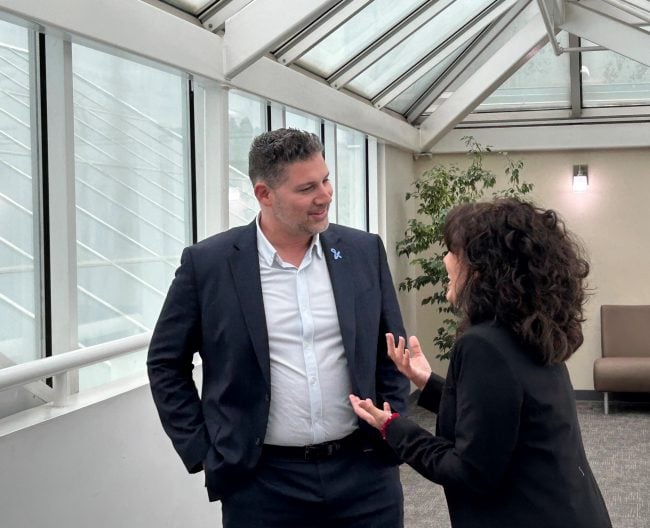There's a constant need for consistency. Just don't count onit.
|I know, those two sentences are filled with redundancies andpolitical flip-flopping. And that's part of the point – ourindustry strives to create processes and nice packages of servicesfor members and potential members. But while that's going on,there's an entire group of very smart and extremely wealthy peoplewho keep throwing a technology wrench in your plans.
|Think of it like this: Credit unions look to lawmakers andgoverning bodies for guidance when it comes to new regulations,deleting old regulations and helping the industry evolve as “it'ssupposed to and as it has” for generations before us. But thisgeneration is dealing with Silicon Valley – something previousgenerations never had to consider, keep an eye on or worryabout.
|Inside a recent article in Inc. Magazine, a phrasereally hit me in the brain and has been slithering around insidelike a water moccasin skimming across a shallow stream. The phraseis only four words and it's a gut-puncher: “Silicon Valley iscoming.”
|The following sentence wasn't any more comforting to read.“There are hundreds of startups with a lot of brains and moneyworking on various alternatives to traditional banking.”
|Let's put this into a broader perspective: The financial system(credit unions, banks, community banks, grandparents with empty icecream containers full of cash in the freezer) have been disruptedand will continue to be until someone with a lot of money andresources figures out how to fully get around the regulations. Eventhe huge banks are panicking. For instance, you're probablyfamiliar with Venmo or the Square Cash app, right? You know, youconnect your debit/credit card and send people money without anyservice/transaction fees. Bank of America is now running nationalcommercials promoting that new, easy feature on their banking app.So, that tells me that even the bigger players are playing catch upwith the startups. Because those money-transfer apps have beenaround for a couple of years. It's similar to the launch andeventual embracing of social media in the credit union industry.That stuff came out in 2006-ish and it took the FFIEC another sevenyears to come out with any sort of regulatory guidance for creditunions. Basically credit unions were in a holding pattern for morethan half a decade.
||Admit it, the phrase, “Back in my day …” never worked on you asa kid when your parents started a sentence like that. As soon asyou heard those words, it was a cue to instantly tune out and startthinking about who you should ask to homecoming or wonder how manyBugles you can fit on the ends of your fingers. My personal best:29.
|
We should rethink that kind of conversation to be something morelike, “Do you know what scares me?” That'll get their (your kidsand employees) attention. I've learned this as a parent toteenagers/college students – let's talk about what scares us.You'll never go wrong and you'll have some of the bestconversations.
|What scares me is that the disruptive forces here and in otherareas aren't really disruptive anymore – they're the standard wayof doing business.
|For instance, accountants in Africa are being asked officiallyby the state minister of finance to “embrace disruptive technology”so they can become more efficient.
|When does the disruption become the norm? I mean, come on. Howmany more times do we have to boringly call Amazon a disruptor?That's what they do and they do it successfully most of the time.They've disrupted bookstores, grocery stores … basically everystore in your hometown has been disrupted by Amazon and now, it'sjust normal. Make no mistake that Amazon will do the same to creditunions in full-blown Amazon Prime fashion within the next fewyears. You want a captive membership? That's what Amazon has.
|Puerto Rico Update
|To be blunt, this beautiful island full of wonderful people andcredit union employees need your damn help. Hurricane Maria was theliteral definition of a disaster for our credit union friends,their families and credit union members. I've had the pleasure ofspeaking with all Puerto Rican credit union CEOs at an event a fewyears ago in San Juan. And I got a good grasp of just how genuinelywonderful these credit unions are for the communities on theisland. I know Texas, Louisiana and Florida have all been hitterribly hard by this hurricane season. I just want you, no, I'masking you to do what you can for our credit union family in PuertoRico. Maria was a true devastation and it's going to take years tobegin to recover. Please do your part as a cooperative helpingcooperatives and donate anything you can to one of theseorganizations:
|Direct Relief: secure.directrelief.org
|Convoy of Hope: convoyofhope.org
|Americares: americares.org
|These organizations are rated as high as you can get when itcomes to reputable charities making sure the money gets to where itneeds to go. They are also exclusively helping those in Puerto Ricoin attempts to get back to some level of a normal life.
|As of this writing, there's been a lot of confusion about creditunion relief efforts for the island. Check in with CUAid.coopregularly and WOCCU as they are attempting to set up emergencyfunding. Right now credit unions in Puerto Rico can apply forassistance, but guess what? They can't because they don't knowabout it and/or they don't have electricity to fill out anapplication and/or credit union officials there are busy trying tofind food and water for their families. It's a terrible situationand it's going to be a very long time before normal is even a wordwe can use to characterize life on the island. Give what you canand, as one credit union CEO said, “Pray for us!”
||

|
Michael Ogden is the ExecutiveEditor at Credit Unions Times. He can be reachedat [email protected]m.
Complete your profile to continue reading and get FREE access to CUTimes.com, part of your ALM digital membership.
Your access to unlimited CUTimes.com content isn’t changing.
Once you are an ALM digital member, you’ll receive:
- Critical CUTimes.com information including comprehensive product and service provider listings via the Marketplace Directory, CU Careers, resources from industry leaders, webcasts, and breaking news, analysis and more with our informative Newsletters.
- Exclusive discounts on ALM and CU Times events.
- Access to other award-winning ALM websites including Law.com and GlobeSt.com.
Already have an account? Sign In
© 2024 ALM Global, LLC, All Rights Reserved. Request academic re-use from www.copyright.com. All other uses, submit a request to [email protected]. For more information visit Asset & Logo Licensing.









